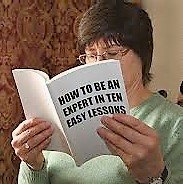Relationship Problems Over 50
Time for something new?
For relationship problems, as for everything else,
if you keep doing what you're doing . . .
you will keep getting what you're getting.

Relationship problems are a natural and predictable part of life.
As an early family systems researcher noted, life is just one darned thing after another. Problems, however, are the same darned thing over and over.
If you don't want to go through the same problems over and over, (and you are unwilling to separate or live parallel lives,) you are going to have to find ways to make ongoing changes, mid-course corrections if you will.
Some things will have to go to make room for new.
Resistance to change can be quite strong

First, no matter how needed a change might be, it involves letting go of what you know, what you are familiar with, and doing things that are just the opposite: unfamiliar, unknown, untried. It's risky. It's worrisome.
Second, automatic alarm systems in your brain are set up to alert you to dangers and potential dangers. They are very good at this. Unfamiliar, new, untried things set these alarms off. One expert in this field has described it as the brain's smoke detector. Like the smoke detector in your house, it doesn't discriminate between smoke from the couch being on fire or the bacon burning on the stove. That is left up to your conscious processes.
Which goes a long way in explaining why couples can have the same basic argument over and over.

Therapists have noted that it is not uncommon for couples to describe having the same basic arguments for years, . . . decades even. No matter what they've tried to do or not do, no matter how well they communicate, no matter what they've promised themselves and their partner, disagreements seem to get out of control.
If that's you, . . . keep reading.
All of those things you've tried most likely were helpful, maybe even necessary, but if you're still getting stuck in the same old problems, they are inadequate.
It's not your fault.
Parts of your brain are doing everything they can to protect the status quo and keep you safe. They're doing it on auto-pilot and you can't get at the controls directly.

Put your attention on growing new ways of being together that fit what is right now. It's not a "once-and-done" program by the way, but with each step the journey gets better and better.
It is not too late, . . . whether you are 60, 70,
. . . or beyond.
Not everyone is willing to do what it takes, but if you are up for using the latest knowledge to dump the past and get something new going, you can use secrets from effective people to turn relationship problems into relationship stepping stones
- to see things differently,
- to break through barriers,
- to have changes of heart, and
- to enlist your automatic brain functions to make it happen.
Are these secrets simple? . . . . . Usually.
Are they easy to apply in your own life? . . . Well, . . . that depends.
- If you are one of the lucky ones for whom the right approaches are natural, then yes, it is easy. For you a change of heart may indeed be all it takes.
- If, however, if you are one of us for whom these things don't come naturally, it is likely to take a bit of consistent effort. Getting from "here" to "there" does takes a commitment, and it doesn't happen over night, but it is clearly doable.

Relationship problems are where the action is. They are like big, red flashing neon signs saying, "This is where you are stuck. Go to work right here!"
It's already clear that people who are effective in relationships take full responsibility for their own beliefs, feelings, and actions. They don't wait around for someone else to move first . . . even though they know that it is easier if both people are on the same page. They don't expect themselves, their partners, or their situations to remain static. They go with the flow, both inside themselves, inside their partners, and in the world around them.
So, here's your invitation to dig deeper into what we know about people who are good at this stuff
- what they assume and believe about themselves
- what they assume and believe about how the world works
- what they assume and believe about their relationships,
- specific practices that build healthy, flexible brain function,
- things they say and do as often as they can,
- things they try to say and do as rarely as possible,
- how they keep things going and growing with their partners,
- how they get back on track when they blow it
- how they stay connected to themselves and act in integrity in all the confusions and cross currents of relating to another.
AND . . . . . for those of us who might be described as well intentioned, but relationally challenged, ways to -
- identify your own assumptions, values, and beliefs that may be getting in your way,
- let go of the ones that do not serve you well now and grow ones that will,
- build habits and skills that will enhance your ability to relate in genuine, respectful, loving, and fun way.
Why now? We've survived together this long.
You do it now because, most simply put, now is the only time you have. The past is gone, water under the bridge, and the future hasn't happened yet.
Seeking more from your closest
relationships in the last third or so of your life has big payoffs. Kids are gone on to their own lives. You either have or haven't achieved the goals set earlier in life. It's time to set new ones
Now that you have more than a few years and probably more than a few ups and downs under your belt, it is the perfect time
for finding specific viewpoints, tools, techniques, skills that are
just right for us to really transform everyday relationship problems
into opportunities -
- for deep personal and spiritual growth
- for companionship and support
- for love and sex
- for fun and adventure.
To be included here, specific skills, techniques, or guidelines have to be clear and doable. And, in fact, there are lots of those and they come in enough varieties that most of us can easily find a good fit. (Deep and nebulous has it's place too, but in my experience that comes more easily later.)
So, why should you believe anything that I say about relationship problems?

Actually, my best advice is don't! Choose what feels right for you. Read the sources for the information presented here. Think about it carefully. Do it for a specific amount of time. Decide for yourself. When it comes to relationships, one size does not fit all.
The plain fact of the matter is that before I started on this quest I would probably have rightly deserved a place on the least likely to become any kind of expert on relationships list. (Maybe I still do. That's for someone else to say I guess.)
But, once I found out how relatively simple the building blocks of good relationships are and how devilishly difficult skillful use of them is if they don't come naturally, I have been obsessed with finding ways to look at the issues involved that make things work easier and ways to consciously make the right assumptions, actions, and words second nature.
And I have read, studied, and tried the specifics presented here and found them useful myself. They work. Well, not all of them in every situation and not all the time, but what's perfect really?
It has been said that the best long term way to get out of the discomfort of relationship problems and related conflict is to go into them, through, and out the other side.
This belief has proven to be the foundation upon which everything else stands for me. I hope it is useful for you too.
But, the first reaction to relationship problems is most often to try to fix them, to run away, to avoid, or to try to overpower the other person. None of this works for long, but it can be very seductive.
Since natural tendencies, conventional wisdom, and common advice often points in the wrong direction, just how do you break free and do what is best for you?
To break negative cycles and start doing the often counter-intuitive things that will work you have to have knowledge, support, and skills to stand in and move through it.
Books, classes, forums, friends can all be big helps with relationship problems. Just try to seek support among people who are going in the same direction you are. A lot of what comes as well meaning advice from family and friends is colored by their own issues and/or meant more to be supportive of you personally than of your relationship.
At this point in our lives most of us know that we need to step up to the challenges and opportunities that come with aging including our relationship problems, but you may find yourself . . .
- Wondering if maybe it's too late.
- Unsure about what you could actually do anyway.
- Doing things that aren't working and never have.
- Thinking that if you have to "work on" a relationship, it must not be any good.
- Feeling frustrated.
If any or all of this sounds familiar, don't worry . . .
. . . . the good news is that it doesn't have to be this way!
Yogi Berra definitely had it right when the said "It ain't over til it's over."
Use this website to find books, programs, ideas that can help ignite a spark to
- transform the everyday relationship problems into opportunities for deep personal and spiritual growth,
- strengthen companionship and support,
- deepen love and enliven sex,
- encourage fun and adventure.
Follow the links on the upper left side of this page to find the kinds of information related to relationship problems you want in areas such as
- physical problems including erectile dysfunction
- relationship savvy expressed as emotional intelligence
- alcohol use and abuse
- being conscious of your relationship
- staying physically fit and as healthy as you can
- etc.
It's not beyond any of us to have better relationships over 50.
The sooner you start, the sooner you reap the rewards. The longer you keep working at it, the longer you reap the rewards.
This is a work in progress.
- First, because though I have set my foot on the path with high hopes, I have a lot to learn and will be sharing it with you here as I find it.
- Second, I suspect that what we are talking about here is better conceived as a journey than a destination.
Copyright @ 2008 - 2018 Better-Relationships-Over-50.com